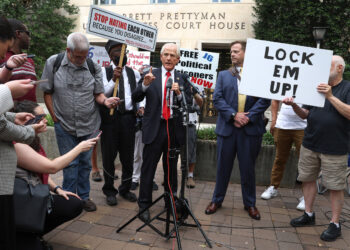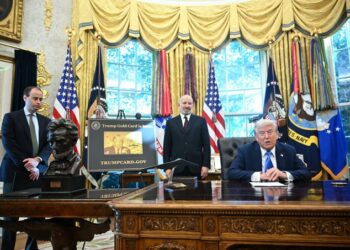BLUF Report: Bannon, Democrats, CCP Ties, and Border Sovereignty
From the Saturday WarRoom, Steve Bannon’s remarks, supported by Marco Rubio’s recent warnings and Todd Bensman’s expertise, bring urgency to addressing our sovereignty as a cornerstone of national safety.
Bannon and Bensman discussed how Immigration raids, while controversial, may serve as a critical test of the U.S. government’s ability to protect its borders and resist foreign influence. Bensman talked about Tom Homan, President Trump’s top border enforcer, and the strategies he would likely use to depart illegals.
Bannon’s introduction of Marco Rubio’s Senate hearing testimony or Secretary of State and their discussion highlights the intersection of internal governance, border security, and global geopolitics. It’s a topic that demands sustained focus to ensure America’s resilience against emerging threats.
Here is a quick clip:
"We May Just Arrest You.” @BensmanTodd On Border Czar Tom Homan’s Message To Liberal Mayors Not Cooperating With Deportations pic.twitter.com/LZcGQLWLmC
— Bannon’s WarRoom (@Bannons_WarRoom) January 18, 2025
Key Points from Saturday’s WarRoom discussion with Todd Bensman:
- Steve Bannon raised concerns about Democrat resistance movements and talked about the framework of the dangers of the Chinese Communist Party (CCP).
- Senator Marco Rubio’s remarks at his confirmation hearing earlier in the week highlighted the CCP’s influence in U.S. affairs: “The CCP represents a long-term existential threat to our republic.”
- Bannon hinted at a connection between CCP interference and Democrat-led resistance movements but stopped short of making direct accusations.
- These remarks coincide with discussions on large-scale immigration raids combined with Democrat resistance to President Trump’s agenda, which Bannon views as a potential flashpoint in the broader battle over sovereignty.
The CCP and U.S. Political Movements
Bannon’s Saturday commentary with Todd Bensman appears to link Democrats’ political strategies to larger geopolitical concerns, particularly with the CCP. During Rubio’s Senate hearing earlier in the week, he underscored the CCP’s growing influence in American institutions: “They infiltrate everything from academia to business to politics.”
Bannon, while not explicitly naming any Democrat leaders as connected to the CCP, drew parallels to historical patterns of foreign actors exploiting domestic divisions for their gain.
This issue gains further weight when considering past accusations of CCP influence operations, such as funding think tanks, lobbying efforts, and attempts to shape U.S. policy. For Bannon, these efforts align with what he perceives as the Democrats’ resistance movement undermining national sovereignty, a cornerstone of his “America First” ideology.
Immigration Raids: A Sovereignty Flashpoint
- Immigration enforcement plays a key role in this broader narrative, which Bensman is an expert on. Bannon argued that large-scale immigration raids are not just about enforcing U.S. law but are also acts of sovereignty. He posited that open borders make the U.S. vulnerable to geopolitical manipulation: "This isn’t just about people crossing the border—it’s about losing control over our destiny,” Bannon said.
- Bensman’s expertise on border security provides a foundational framework for Bannon’s assertions. Bensman has warned that loose immigration policies can serve as conduits for exploitation by foreign adversaries, including China. “Unsecured borders invite geopolitical exploitation,” Bensman noted in his analysis, pointing out how migrant flows can serve as cover for organized crime and other foreign influence operations.
- Bannon emphasized that immigration raids could ignite political and social tensions, framing them as a litmus test for the nation’s commitment to sovereignty. "Raids will show who is truly invested in protecting this country,” he remarked.
Why This Issue Matters: National Security at Risk
If Bannon’s hints of CCP ties to Democrat movements hold any weight, it underscores a significant national security risk. Rubio’s testimony signals bipartisan acknowledgment of the CCP as a threat, creating a context where these concerns demand closer examination.
Border Security as a Strategic Priority
Bensman’s insights on Saturday strengthen the argument that controlling immigration is a critical component of sovereignty. For Bannon, the ability to enforce immigration laws reflects the strength of the government to resist both internal subversion and external manipulation.
Potential for Broader Conflict
Immigration raids may trigger immediate political battles and expose underlying vulnerabilities in U.S. governance, according to Bensman. Bannon sees this as a moment where Americans must decide between safeguarding sovereignty or succumbing to external pressures, which aligns with Rubio’s hearing testimony.
Larger Implications
Bannon’s discussion hints at a broader clash over sovereignty, where immigration, foreign interference, and national security intersect. If validated, these connections could reshape how Americans view border policies and the influence of global powers like China.
The stakes are high. As Bannon frames it, sovereignty is not merely a political talking point but a defense mechanism against foreign domination. Bensman’s evidence on border vulnerabilities highlights the strategic importance of securing the U.S. against illegal immigration and potential subversive activities linked to adversarial nations.
For more context, watch this full segment from Saturday’s WarRoom featuring Todd Bensman:
"We May Just Arrest You.”: Todd Bensman On Border Czar Tom Homan’s Message To Liberal Mayors Not Cooperating With Deportations
Watch here for the entire WarRoom program from Saturday:
Watch WarRoom Live with Steve Bannon
https://t.co/uq9rrHKA9i— Bannon’s WarRoom (@Bannons_WarRoom) January 18, 2025




